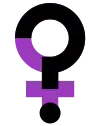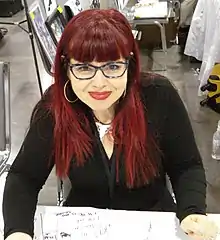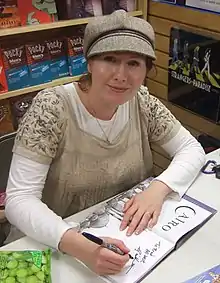| Part of a series on |
| Feminism |
|---|
.svg.png.webp) |
|
|
| Part of a series on |
| Feminist philosophy |
|---|
 |


.jpg.webp)


This is a list of feminist comic books and graphic novels.[2]
A
- A-Force by G. Willow Wilson, Marguerite Bennet, and Jorge Molina. A Marvel Comics series about an all-female team of Avengers.[3]
- Anya's Ghost by Vera Brosgol. Graphic novel about a teen Russian immigrant girl who befriends a dangerous ghost.[4]
B
- The Ballad of Halo Jones by Alan Moore and Ian Gibson.[5]
- Batwoman: Elegy by Greg Rucka and J. H. Williams III.[4] DC Comics graphic novel, originally serialized in Detective Comics. A lesbian super-hero faces a murderous super-villainess.
- Bitch Planet by Kelly Sue DeConnick and Valentine De Landro. Image Comics comic book series about a prison planet for "non-compliant" women.[6][7]
- Black Orchid by Neil Gaiman and Dave McKean[8]
- Blue Sky by Murasaki Yamada. Serial that depicts the economic struggles of a woman after divorce and the societal criticism she must ignore when she later lives with a younger man.[9]
- Buffy the Vampire Slayer[10]
C
- Captain Marvel by Kelly Sue DeConnick and Dexter Soy. The Marvel Comics superhero was renamed from Ms. Marvel, replaced her one-piece swimsuit style uniform with a more practical flight suit, and became the source of her own powers, emphasizing self-sufficiency.[4][11]
- Castle Waiting, by Linda Medley. Fantagraphics. Medieval fantasy series about a pregnant woman who takes refuge in a castle with fairy tale characters.[12][13]
D
- Death: The High Cost of Living by Neil Gaiman, Chris Bachalo, and Mark Buckingham. Vertigo Comics miniseries about a female Death taking temporary human form.[4][14]: 19–20
- Dirty Plotte by Julie Doucet[15]
- Dykes to Watch Out For by Alison Bechdel[16]
F
G
H
- Hark! A Vagrant by Kate Beaton. Webcomic that frequently parodies sexism in classic literature and pop culture.[4]
I
- I Kill Giants by Joe Kelly and artist J. M. Ken Niimura. An anti-social fifth grade girl retreats into a fantasy world where she kills giants with a hammer.[4]
- It Ain't Me, Babe (1970). Contributors included Trina Robbins, Meredith Kurtzman, Barbara Mendez, Michele Brand, Lisa Lyons, Hurricane Nancy Kalish, and the mononymous "Carol"[19][20][21]
J
L
- Lazarus by Greg Rucka and Michael Lark.[4]
- Love and Rockets by Gilbert, Jaime, and Mario Hernandez.[4]
- Lumberjanes by Brooklyn Allen, Grace Ellis, ND Stevenson, and Shannon Watters. Boom! Studios series about five teenage girls adventuring at summer camp.[4][23]
M
- Man-Eaters by Chelsea Cain, Kate Niemczyk and Lia Miternique at Image Comics. Toxoplasmosis has muted to turn people who menstruate into dangerous panthers, so now there are hormones in the water to prevent menstruation and tame the population with female genitals. Cats = women, pantherism = feminism and the dystopian society controlling women = the patriarchy.
- The Maxx by Sam Kieth.[4][24] Image Comics series. A freelance social worker deals with her pain by retreating into a fantastic alternate reality where she is protected by the monstrous titular hero.
- Ms. Marvel (Carol Danvers)[25]
- Ms. Marvel (Kamala Khan) by G. Willow Wilson and Adrian Alphona.[26][27]
N
O
- ODY-C by writer Matt Fraction and artist Christian Ward, published by Image Comics. A genderbent version of Homer's The Odyssey set in outer space, which deconstructs traditionally male-centric stories.
- Oh Joy Sex Toy sex education comics by Erika Moen.
- Ōoku: The Inner Chambers by Fumi Yoshinaga. Manga serialized in Melody magazine, about an alternate history medieval Japan in which an unknown disease kills most of the male population, making a matriarchal society with a harem of men serving the female shōgun.[30]
P
- Paper Girls by Brian K. Vaughan and Cliff Chiang
- La Perdida by Jessica Abel. Pantheon Books series about a young American woman in Mexico.[31][32]
- Persepolis by Marjane Satrapi. Autobiographical graphic novel about a woman growing up in 1980-1995 Iran.[4][33]
- Pretty Deadly by Kelly Sue DeConnick and Emma Ríos.[4]
- Princeless by Jeremy Whitley and M. Goodwin[4][34] Action Lab Comics series. A young black princess rescues herself and her five sisters.
- Priya's Shakti[35][36][37] by Ram Devineni, Lina Srivastava, and Dan Goldman.
- Pudge, Girl Blimp
R
- Rat Queens by Kurtis J. Wiebe and various artists.[4][38] Image Comics series. Four free-spirited female adventurers in a Dungeons & Dragons-inspired fantasy setting.
- Red Sonja by Gail Simone. Dynamite Entertainment comic book series reimagining the fantasy swordswoman.[4]
S
- Sally Heathcote: Suffragette by Mary M. Talbot, Kate Charlesworth and Bryan Talbot.[39]
- Sesame But Different by Chiapoppy.[40][41]
- Sex Criminals by Matt Fraction and Chip Zdarsky. Image Comics series. A woman can stop time when she has an orgasm.[4]
- Shakmagia (Jewelry Box in English), a feminist Egyptian magazine, collecting political comics stories by different authors.[42]
- She-Hulk. Marvel Comics series about a female lawyer that gains Hulk like powers, that, depending on the writer, varies between a male fantasy, and a witty swashbuckler.[4][43]
- Shin Kilali by Murasaki Yamada. A semi-autobiographical story in which the protagonist, a mother of two whose marriage of ten years is slowly failing, eventually decides to find a job despite protest from her husband.[9]
- Strong Female Protagonist written by Brennan Lee Mulligan and drawn by Molly Ostertag.
- Suffrajitsu: Mrs. Pankhurst's Amazons by Tony Wolf with art by Joao Vieira. A Jet City Comics trilogy about the adventures of a secret society of martial arts-trained women, known as the "Amazons", who serve as bodyguards and field agents for the leaders of the radical women's suffrage movement in England during early 1914.[44]
T
- Tamara Drewe by Posy Simmonds[45][46]
- Tank Girl by Jamie Hewlett and Alan Martin.[47]
- This One Summer by Mariko and Jillian Tamaki[4][48]
- Tits & Clits Comix[21] anthology series edited by Joyce Farmer and Lyn Chevli
- Twisted Sisters by Aline Kominsky-Crumb and Diane Noomin[49]
U
- Umbral by Antony Johnston[4]
- United States of Banana (graphic novel adaptation)[50]
W
- Wimmin's Comix[51] anthology series founded by Trina Robbins that ran from 1972 to 1992.
- Woman World by Aminder Dhaliwal, a science fiction comic about the development of an all-woman civilization after men become extinct as a result of a birth defect.
- Wonder Woman, DC Comics series. Iconic superheroine, originally symbolizing the 1940s liberated woman.[10][52][53][54]
Y
See also
References
- ↑ "Alison Bechdel", MacArthur Fellows Program, September 17, 2014.
- ↑ A feminist is generally defined as advocating for or supporting the rights and equality of women; see "feminist". Oxford English Dictionary (3rd ed.). Oxford University Press. 2012.
An advocate or supporter of the rights and equality of women. 1852: De Bow's Review ('Our attention has happened to fall upon Mrs. E. O. Smith, who is, we are informed, among the most moderate of the feminist reformers!')
- ↑ Diaz, Eric (2015-05-19). "Review: Marvel's A-FORCE #1". The Nerdist. Archived from the original on 2019-03-13. Retrieved 2015-05-22.
- 1 2 3 4 5 6 7 8 9 10 11 12 13 14 15 16 17 18 19 Gilley, Casey (June 2, 2014). "Reading List: A Field Guide to Fifteen Feminist Comics". comicbookresources.com. Comic Book Resources. Retrieved December 19, 2014.
- ↑ Lance Parkin (2013), Magic Words: The Extraordinary Life of Alan Moore, p. 9, ISBN 978-1781310779
- ↑ Abad-Santos, Alex (December 9, 2014). "Bitch Planet is the feminist comic book we've all been waiting for". Vox. Retrieved December 20, 2014.
- ↑ Thomases, Martha (December 19, 2014). "Martha Thomases: Gifting Comics". comicmix.com. ComicMix Pro Services. Retrieved December 20, 2014.
- ↑ Cantrell, Sarah (2012). "Feminist Subjectivity in Black Orchid," in Tara Prescott, Aaron Drucker (eds.), Feminism in the Worlds of Neil Gaiman: Essays on the Comics, Poetry and Prose, p. 102.
- 1 2 Schodt, Frederik L. (1996). Dreamland Japan: Writings on Moderm Manga. Stone Bridge Press, Inc. p. . ISBN 9781880656235.
- 1 2 Berlatsky, Noah (August 13, 2013). "Some of the Greatest, Most Popular Comic Books Are Feminist". The Atlantic. Atlantic Monthly Group. Retrieved December 19, 2014.
- ↑ Arbeiter, Michael (October 2014). "9 Fascinating Facts About Captain Marvel, The Studio's First Super Heroine". Bustle. Retrieved December 20, 2014.
- ↑ Edgar, Sean (January 22, 2013). "Castle Waiting: Volume I". Paste. Retrieved December 20, 2014.
- ↑ "Graphic Novels: About Women. By Women". flashlightworthybooks.com. Flashlight Worthy. 2014. Retrieved December 19, 2014.
- ↑ Martin, Rachel R. (2012). "Speaking the Cacophony of Angels: Gaiman's Women and the Fracturing of Phallocentric Discourse". In Prescott, Tara; Drucker, Aaron (eds.). Feminism in the Worlds of Neil Gaiman. McFarland. ISBN 9780786466368. Retrieved December 20, 2014.
- ↑ Chase, Alicia (2013). "You Must Look at the Personal Clutter: Diaristic Indulgence, Adolescence, Feminist Autobiography," in Jane Tolmie (ed.), Drawing from Life: Memory and Subjectivity in Comic Art, University Press of Mississippi, p. 225.
- 1 2 Chute (2010), p. 177.
- ↑ Constable, Liz (2002). "Consuming Realities: The Engendering of Invisible Violences in Posy Simmonds's 'Gemma Bovery' (1999)", South Central Review, 19(4)–20(1), Winter 2002 – Spring 2003, pp. 63-84.
- ↑ Watts, Andrew (November 2011). "Cracks in a cartoon landscape: Fragmenting memory in Posy Simmonds' Gemma Bovery", Essays in French Literature and Culture, 48, pp. 45–65: "In reflecting on which elements Simmonds adapts and appropriates from Madame Bovary, Constable identifies Gemma Bovery as a feminist satire structured around metaphors of food, consumption, and gendered violence."
- ↑ "Underground Comix Collection". Comix Joint. Retrieved December 20, 2014.
- ↑ Burns, Kate (2003). "Cartoons and comic books," in George Haggerty, Bonnie Zimmerman (eds.), Encyclopedia of Lesbian and Gay Histories and Cultures, Taylor & Francis, p. 149.
- 1 2 Williams, Paul (2010). "Questions of 'Contemporary Women's Comics,'" in Paul Williams, James Lyons (eds.), The Rise of the American Comics Artist, University Press of Mississippi, p. 138.
- ↑ Sen, Jai (October 18, 2013). "Paige Braddock Changes the World Without Bending or Breaking It". The Clyde Fitch Report. Retrieved 5 December 2019.
- ↑ Regan, Tim (December 11, 2014). "Meet the Local Illustrator of Lumberjanes, a Feminist, Fast-Growing Summer Camp Comic". Washington City Paper. Washington, D.C. Retrieved December 20, 2014.
- ↑ Klock, Geoff (2002). How to Read Superhero Comics and Why, A&C Black, p. 8.
- ↑ White, Brett (July 9, 2014). "Marvel Women of the 70's: Ms. Marvel". marvel.com. Marvel. Retrieved December 23, 2014.
- ↑ Lynskey, Dorian (March 25, 2015). "Kapow! Attack of the feminist superheroes". The Guardian. Retrieved February 6, 2016.
- ↑ Maggs, Sam. "A Feminist Ranking of Female Superheroes". Marie Claire. Retrieved February 6, 2016.
- ↑ Chute, Hillary L. (2014). Outside the Box: Interviews with Contemporary Cartoonists, University of Chicago Press, p. 12.
- ↑ "Book Review: Nemi – Vol 3 – Author Lise Myhre", Horror News, 2010
- ↑ "The Herstory of Sense of Gender Award" (PDF). gender-sf.org. Japanese Association for Gender Fantasy & Science Fiction. August 2014. Archived from the original (PDF) on January 15, 2021. Retrieved December 23, 2014.
- ↑ Abel, Jessica (September 29, 2011). "Are your comics feminist?". jessicaabel.com. Jessica Abel. Archived from the original on December 22, 2014. Retrieved December 22, 2014.
- ↑ Díez Balda, María Antonia (2004). "La imagen de la mujer en el cómic: Cómic feminista, cómic futurista y de cienciaficción" (PDF). Asociación de mujeres investigadoras y tecnólogas. Dpto. Sociología y Antropología Social. Facultad de Ciencias Sociales. Univ. de Valencia. Retrieved December 22, 2014.
- ↑ Chute (2010), p. 242.
- ↑ Pfeiffer, Elisabeth (January 11, 2013). "Interview with Jeremy Whitley of Princeless". Women Write About Comics. Retrieved December 20, 2014.
- ↑ "Comic Book: Priya's Shakti". priyashakti.com. Rattapallax. Archived from the original on December 20, 2014. Retrieved December 22, 2014.
Led by Priya, her followers, both men and women, spread the message of women's equality across the Earth, and not to remain silent in the face of violence against women and injustice.
- ↑ Chowdhury, Jennifer (December 15, 2014). "India's Newest Heroine Breaks Rape-Talk Taboo with Comic Book". NBCNews.com.
- ↑ "Asian Women Giving Circle". Archived from the original on 7 January 2015. Retrieved 29 December 2014.
- ↑ Ballou, Elizabeth (June 17, 2014). "'Rat Queens' Comic Allows Female Characters to Kick Some Butt...With Clothes On". Bustle. Retrieved December 20, 2014.
- ↑ Lehoczky, Etelka (September 22, 2014). "'Sally Heathcote' Rescues Women's Suffrage From The Doldrums". NPR. Archived from the original on November 22, 2023. Retrieved November 22, 2023.
- ↑ "Sesame But Different (LGBT)". Webtoon. 2021. Retrieved 16 March 2021.
- ↑ "Lesbische Sichtbarkeit mit Poppy und Chia" [Lesbian visibility with Poppy and Chia]. Mannschaft Magazin (in German). 25 December 2020. Retrieved 16 March 2021.
- ↑ El Deeb, Sarah (November 20, 2014). "New Egypt comic artists push limits of expression". U-T San Diego. Associated Press. Retrieved December 20, 2014.
- ↑ Rosenberg, Alyssa (May 21, 2014). "She-Hulk is a feminist hero, not a male fantasy". Washington Post. Retrieved December 20, 2014.
- ↑ "Home". suffrajitsu.com.
- ↑ "Fiction Book Review: Tamara Drewe". Publishers Weekly. PWxyz. 2008. Retrieved December 23, 2014.
- ↑ Ho, Elizabeth (Summer 2011). "From 'Having it all' to 'Away from it all': Post-feminism and Tamara Drewe", College Literature, 38(3), pp. 45–65, p. 46: "Tamara Drew represents the experience of feminism as non-linear, consisting of sometimes overlapping, sometimes conflicting, histories."
- ↑ Imelda Whelehan, Esther Sonnet (1997), "Regendered Reading: Tank Girl and Postmodernist Intertextuality", Trash Aesthetics: Popular Culture and Its Audience, pp. 31–47, ISBN 978-0745312026
- ↑ Dueben, Alex (May 7, 2014). "Mariko and Jillian Tamaki Tell the Story of "This One Summer"". comicbookresources.com. Comic Book Resources. Retrieved December 20, 2014.
- ↑ Williams (2010), p. 139.
- ↑ Smith, Amanda (2018). "A Graphic Revolution: Talking Poetry and Politics with Giannina Braschi". Chiricu. 2. No. 2 – via JSTOR.
- ↑ Young, Allison J. Kelaher (2005). "Comics," in James Thomas Sears (ed.), Youth, Education, and Sexualities: An International Encyclopedia, Volume 1, Greenwood Publishing Group, p. 187.
- ↑ Lepore, Jill (December 5, 2014). "Wonder Woman: the feminist". Guardian. Retrieved December 20, 2014.
- ↑ Lincoln, Ross (December 17, 2014). "Five Favorites from the Comics and Cosplay Channel: From the Desk of Senior Editor Ross Lincoln". Escapist. Defy Media. Retrieved December 20, 2014.
- ↑ Knight, Gladys L. (2010). Female Action Heroes: A Guide to Women in Comics, Video Games, Film, and Television, ABC-CLIO, p. 304.
- ↑ "Y: The Last Man - The F-Word". www.thefword.org.uk. 18 July 2011. Retrieved 2016-07-25.
Further reading
- AMC (2004). "Feminism," in Gina Renée Misiroglu, David A. Roach (eds.), The Superhero Book: The Ultimate Encyclopedia of Comic-book Icons and Hollywood Heroes, Visible Ink Press, pp. 212–215.
- LeBas, Sam (2014). "Comicsonice - Tag: Feminism". comicsonice.com. Sam LeBas. Archived from the original on February 14, 2015. Retrieved December 20, 2014.
- McCubbin, Laurenn (December 18, 2014). "Why 2014 was the Year of the Female Comic Fan". Paste.
- Riesman, Abraham (December 18, 2014). "The 10 Best Comics Series of 2014, the Year Feminism Conquered Comics Culture". New York.
- Robbins, Trina (2010). "Feminism," in M. Keith Booker (ed.), Encyclopedia of Comic Books and Graphic Novels, ABC-CLIO, pp. 212–218.
- Scott, Suzanne (2013). "Fangirls in refrigerators: The politics of (in)visibility in comic book culture", Transformative Works and Cultures, 13.
This article is issued from Wikipedia. The text is licensed under Creative Commons - Attribution - Sharealike. Additional terms may apply for the media files.